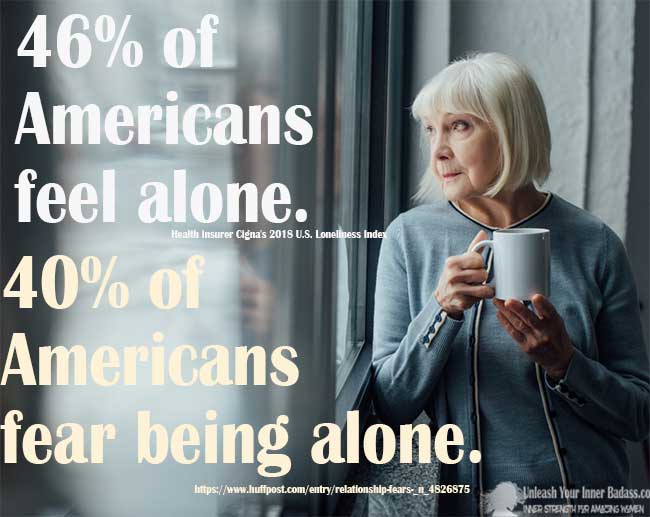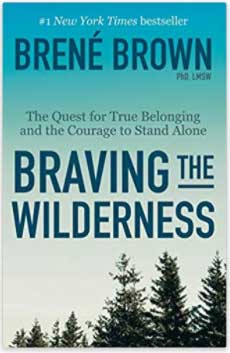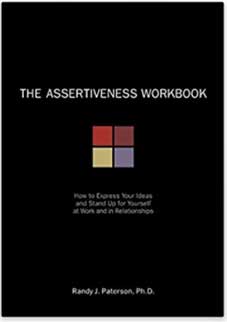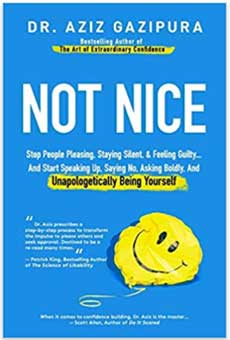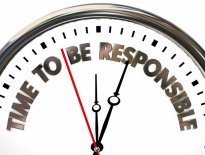Up until a decade ago, visitors would occasionally stop by my house.
After I invited them in, I’d stumble, stagger, and stutter, falling over myself to please them. This would continue as long as they stayed, sometimes hours at a time.
“Would you like a drink?”
“Something to eat?”
“Is it too cold in here for you?”
I’d be careful not to talk about myself or my life, since I had read that “People only care about themselves and don’t want to hear about YOU” (Thanks Dale Carnegie!).
I would stare intently as they talked about their own life, even though quite often, I’d feel bored beyond measure after about 10 minutes. Even so, my only utterances were, “Wow!”, “Awesome!”, “How’d that make you feel?”.
In the back of mind, the running self-talk reminded me, “I must never mention myself or offer advice because they must LIKE ME!”
This pattern repeated itself in every place, at every time, and with every person I encountered – at work, academia, and social gatherings.
And you know what?
The people would leave and carry on and, often, I’d never (or rarely) hear from them again!
That inevitably led to a frantic soul-searching monologue that went something like this:
“Why don’t they call? Don’t they LIKE me?”
“Should I reach out and remind them that I WANT TO BE FRIENDS?”
“What did I do wrong?”
“What’s wrong with me?”
For those that DID contact me again, however, guess what transpired 99% of the time?
They contacted me when they wanted something.
As long as I was “giving”, we were “friends”. But as soon as I said “no”, they were off latching onto the next person who could give and do for them.
Which led to a repeat of the “What’s wrong with me?” monologues.
What is a People Pleaser?
It’s fine (and highly recommended!) to be kind to others, so what defines a “people pleaser”?
There are three aspects that define whether someone’s actions are simply “people pleasing” or rather, just actions from a kind-hearted, giving human being:
- Intention / Source
- Duration
- Ignoring Self
1. Intention / Source
A people pleaser goes out of their way to:
- “not make anyone mad”
- “not rock the boat or make waves”
- Entice others to think about them in a certain (positive) way
Among other positive-attention seeking behaviors.
So, what’s the difference between someone who’s just generous and kind versus a true people pleaser?
The person’s intention, or the source of their behavior.
If your actions are borne out of fear, I’m willing to bet you fall along the “people pleasing” side of the spectrum.
Fear of what, you say?
People pleasers act out of fear of being:
- Alone
- Ridiculed
- Ostracized / Shunned
- Misunderstood
Let’s look at Jane.
Jane spends at least 2-3 hours every day of the week doing altruistic acts, often pushing her own priorities and needs aside to help, care for, and give to others.
Is she just kind, or is she a bona fide people pleaser?
Look at the source.
First, let’s assume Jane knows exactly who she is and what she wants in life. She’s not afraid to stand up for her values and beliefs, and she’s perfectly fine with speaking her voice and standing alone.
But Jane feels that, even though people feel divided and contentious against others who don’t subscribe to their particular ideology, theology, or any other – ology, they are all connected by the deeper human traits and needs. The need for love and acceptance. The need for safety and security. The need for autonomy and control.
Jane is confident in who she is and what she believes, but she chooses to look beyond the superficial boundaries that separate and focuses on the deeper traits that connect us all. She loves helping others, regardless of who they are, what they believe, or what they think about her.
What do you say?
Is Jane a people pleaser?
In this hypothetical example, she is not.
But what if Jane does all this caring and giving because she’s afraid of “not being liked”?
Maybe she promised herself she’d go to the gym today at 5:00, but at 4:55, Fred calls. He needs her to do the work project he “forgot” to do, and it’s due tomorrow at 9 am.
Jane quickly responds with “Sure, I’ll do it” (scrapping the gym plans), but she does so because the thoughts going through her head are along these lines:
- “I need Frank to think I’m a good person”
- “Maybe if I do this, Frank will help me out with that presentation I have next month”
- “If I don’t, people will talk about me”
- “Other people’s needs are more important than my own” (few actually think that, but the feeling is there…)
Here, Jane is a definitely being a people pleaser. Her reasons come from fear.
2. Duration
When I talk about duration, I’m talking about “What percentage of time are your actions based on people pleasing?”.
Everyone has selfish moments, bad days, days when we slip into old habits, and days when our self-confidence and hopefulness are in the tank.
But when you think about most of your interactions with others, what percentage of them:
- Come from a place of fear and insecurity
- Are done with resistance and dread
- Ignore your own values, wants, and needs (or at least put them second)
- Make you feel worse afterward (just because you didn’t want to do it in the first place and are sorry you did)
If you honestly feel that 50% or more are done not out of genuine compassion but for these other reasons, you’re leaning on the people-pleasing side of the spectrum.
3. Ignoring Self
This was mentioned already, but a major part of people pleasing is ignoring your own needs, values, and wants, so it deserves its own heading.
Standing up for yourself, and risking rejection, ridicule, and isolation in the process, is a conscious choice. If you haven’t developed the self-love and self-confidence it takes to wander into this wilderness, you’re much more likely to fall back into old people-pleasing habits.
When you’re interacting with others or doing for others, take a moment to reflect. Ask yourself, “Am I honoring myself by doing this?”. “What’s my motivation here?”
Guess What? People Pleasing Doesn’t Work…
There are plenty of reasons to give up your people-pleasing ways, but I’m going to tell you the most important ones:
It Never Works
I’m sure you’ve encountered someone in your life where you bent over backwards to do whatever they asked – when they asked.
“Oh, you don’t like my shirt? Let me go change it now!”
“You don’t like when I speak my thoughts? I’ll be sure to stay quiet from now on! Don’t worry!”
I bet it didn’t work, did it?
It rarely does.
They still leave / talk about you behind your back / ridicule you / ignore you, etc.
It’s inevitable.
People may tell themselves that they will be happy if you only did this or said that, but the truth is, people want genuineness.
When you’re genuine, honest, and true to yourself, you attract others who value what you have to offer. And people LOVE you more than the pleasing-suckers ever could.
And most importantly, you’re MUCH HAPPIER. Even if, by chance, you stand alone.
Fake people abound everywhere. Just log in to your social media account and take a look.
Being fake makes you miserable – somewhere down the road. And after a while, everyone tires of being around disingenuous people.
It all falls apart at some point.
Why Would You WANT Everyone to Like You All the Time?
Seeking everyone’s love and adoration all the time is not a noble goal at all. How boring would life be if everyone dropped to the floor and worshipped your every move, 24/7?
Another person’s opinion of you is just that – someone’s opinion! It has no relation to who you are or how valuable and worthwhile you are.
Take a gander at the people who stood out and made this world a better place throughout history. Very few of them were loved and adored!
Most were ostracized or exiled from family, friends, colleagues, and groups.
And THEY are the ones whose stories we remember and learn about in school.
If you’re adored and commended everywhere you go, you’re doing something wrong!
Strive to be uniquely YOU – and then stand proud of YOU. Even if you feel like an outcast or a pariah.
Learn to truly love yourself – including your imperfections. Just be sure to keep working on those.
How to Stop Being a People Pleaser
The most fundamental way to stop being a people pleaser is also the hardest, but the rewards are without measure.
1. Love yourself.
Truly, deeply fall in love with yourself.
I’m not saying become an egomaniacal asshole.
Take time to flesh out who you are, what you’re good at, what you like about yourself, and what you’d like to work on.
Forgive yourself.
Treat yourself with the kindness you’d show to a little child.
Change your self-talk to be supportive, caring, yet stern.
Understand how to set boundaries and use them.
Get clear on what you value and who it is you want to be.
Then BE HER.
Know that you are enough.

Most of all, learn to trust yourself.
The more you understand your strengths, weaknesses, values, beliefs, wants, and needs, the easier it becomes to truly trust and rely on yourself.
When you’ve accomplished all that, for the most part, you’re no longer afraid of someone else’s ridicule or threats of rejection, because YOU ARE ENOUGH.
Fear will always be there, but so will the courage to act in the face of fear.
Be your own best friend. Your best confidant. Your own trusty path maker.
Then have the courage to stand tall, to let your inner light shine, and to let your honest voice boom forth for all to hear.
Because you are freaking amazing.
And no amount of external validation or ridicule can ever change that.
2. Learn to Be Assertive
Assertiveness training can help everyone – even skilled communicators. There’s a big difference between communicating passively, aggressively, or passive-aggressively.
Once you learn to really love yourself AND learn how to communicate in a way that serves both you and others, every part of your life gets better.
This isn’t to say life’s going to suddenly be all sunshine and roses or that your problems will magically disappear like cotton candy in water, but your life WILL get better in innumerable ways.
It takes consistent practice and awareness, but again, the rewards are immeasurable.
3. Be Undeniably, Unapologetically YOU
It’s hard to pretend to be the person you think someone wants you to be, and you can’t pretend forever. Eventually, the real you comes out.
True story:
I ran into friend from high school a few years ago. She came up to me and spoke with an exaggerated British accent (she’s not British). After a while, I tired of her acting, and I asked her “Why are you talking like that?”.
She leaned in close, and in her normal voice, she whispered, “I got married a year ago. I told him I’m from Britain so don’t ruin this for me!”.
I just stood there, stunned, thinking of how hard it must be to keep up the act (and the fake accent) 24/7 – even when you’re tired, sick, grumpy, or angry…
Wow.

How she consistently kept it up for a year (so far) was beyond me, but I couldn’t help but wonder, “How much longer can you keep doing this?”. 10 years? 50 years?
How tiring!
Being true to yourself not only boosts your self-esteem in the long run, it attracts people who value you for you.
When you start being genuine, some people may go away, but those were never true friends or supporters anyway.
In Braving the Wilderness, Brene Brown’s research found that while people long to “fit in” and belong to specific groups, true belonging happens when we “belong to ourself” and simultaneously “belong nowhere and everywhere” (p. 41).
True belonging is the spiritual practice of believing in and belonging to yourself so deeply that you can share your most authentic self with the world and find a sacredness in both being a part of something and standing alone in the wilderness. True belonging doesn’t require you to change who you are; it requires you to be who you are.
REMEMBER...
You are an amazing and incredible gift to this world – just the way you are.
No one’s perfect.
Having the courage to face and tirelessly work on those imperfections is the hallmark of all great souls.
Let go of all those actions that elevate and please others while denigrating your true self.
Stand tall and shine your amazing, inner light brightly for all the world to see.
Be brave enough to stand alone, if need be.
Get comfortable being uncomfortable.
When you stop spending your time pleasing other people, your soul expands, your life vastly improves in every area, and the world becomes a better place because of your courage.
Go get ‘em, Tiger!



